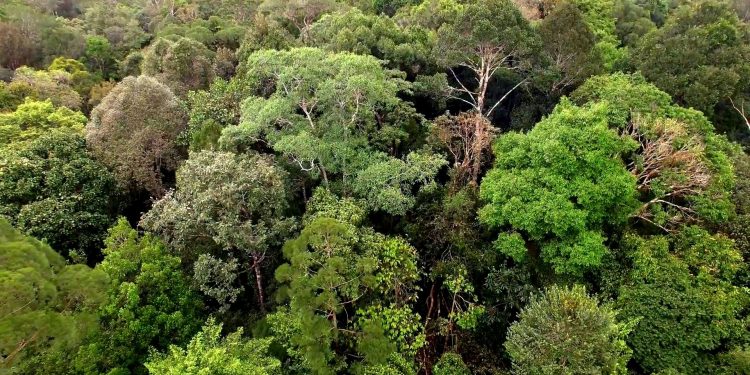Borneo is the third-largest island on the planet and two-thirds of which belong to Indonesia.
Straddling the equator, and politically divided by Indonesia, Brunei, and Malaysia, Borneo is home to one of the richest ecosystems in the world.
Borneo is also known to hold a very dense and often impenetrable jungle.
Borneo’s stable and humid tropical climate has ensured that its lowland rainforests are home to some of the world’s most biodiverse collections of flowering plants, birds, and animals. It’s an explorer’s dream.
Borneo shelters an impressive panel of species such as reptiles, lichens, the Asian elephant, and the Sumatran Rhino (endangered).
Further south, in the tropical forests, it is the sweet orangutan of Borneo and its wilder cousins who steal the show.

Add to this 160 species of snakes, 1,000 types of ants, 3,000 variations of sawflies, bees, and termites, and Borneo is like a biodiversity paradise.
It only took man and fire to upset the magnificent forest of the island.
First of all, there were the Chinese traders who hunted rhino horns, precious bird nests for soup, and aromatic wooden gaharu.
Muslim and Portuguese traders followed in their wake to find precious pepper and gold to sell at home.
The tractor and chainsaw ushered in a long slide towards wholescale ecological murder. It was open season in the irreplaceable rainforests.
In Indonesia’s Kalimantan, companies from Europe, Australia, and the United States were offered lucrative permits from the Indonesian government to drill for oil and gas and strip-mine for coal.
Questionable licenses were granted to political friends who appropriated thousands of hectares of land, turning the primary forest into unsustainable, single-crop plantations of oil-palm, rubber trees, and industrial timber destined for the paper industry.
Oil, coal, and gold mining hit an all-time high. In addition, major fire-related devastation in the Kalimantan rainforest over an area of 27,000 km2 was reduced to ashes in one year.
All this is due to a severe drought due to the El Niño phenomenon and reckless agricultural fires.
It is therefore difficult today to know more about the future of Borneo and its forest. As the rainforest narrows, wildlife becomes closer and closer to humans. Illegal international trade in animals is flourishing more and more.
However, we still have a glimmer of hope.
The World Wildlife Fund won a major breakthrough when the three governments of Borneo, Malaysia, and Brunei signed a joint declaration to conserve an area of 220,000 km2 known as the Heart of Borneo.



